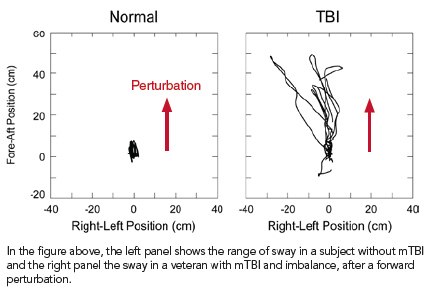Advanced Platform Technology Center
Diagnosing Balance Impairments Following Mild Traumatic Brain Injury
Chronic balance impairment is a known pathological condition of both civilian and military traumatic brain injury (TBI), however little is known regarding its underlying mechanisms. APT Center Investigators are combining a detailed assessment of walking and balance with measures of vestibular function (the parts of the inner ear and brain that process the sensory information for controlling balance and eye movement) to determine whether there are injuries to specific neural structures that may explain TBI-related disequilibrium.

Veterans of the Iraq and Afghanistan conflicts with disequilibrium who had experienced a mild TBI (mTBI) due to blast and/or blunt head trauma exhibit specific and repeatable deficits in standing and walking stability when compared to a similar group of veterans with mTBI without balance problems. They tend to sway more, especially when standing with eyes closed and on a surface that is not firm, and they have more difficulty keeping their balance when disturbed.
These important findings show it may be possible to demonstrate a measurable physiological correlate to the chronic symptom of disequilibrium after mTBI. These quantifiable physiological measures may provide a more robust record of injury that can be followed over time and used to optimize treatment and document the effectiveness of various therapies. Lastly, this ability to quantify TBI-related neurological deficits precisely may be important for making decisions regarding return to normal activities and assessing the risk of repeat injury.
Principal Investigator: Mark Walker, M.D.
Funding Agency: Department of Defense




















